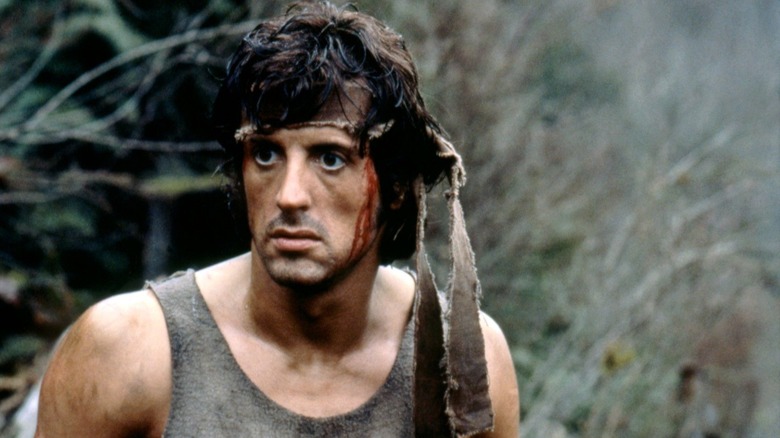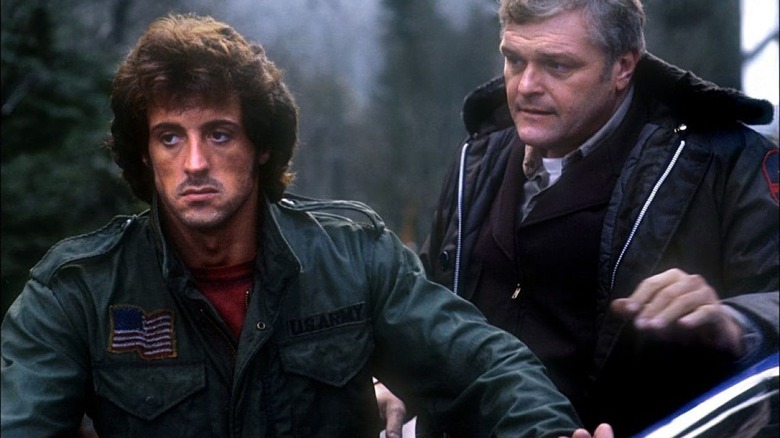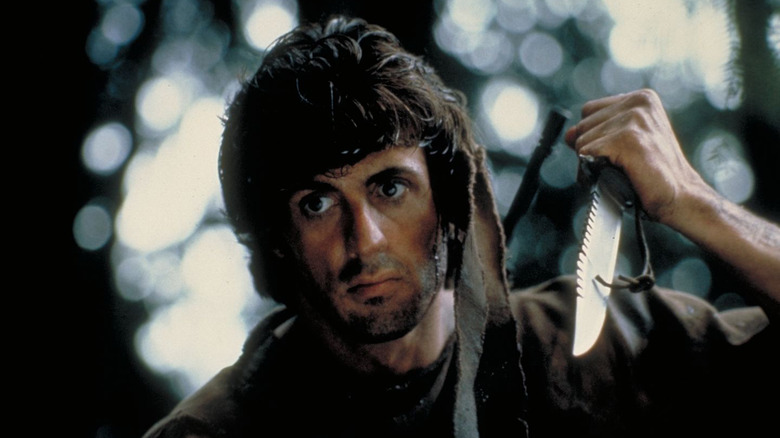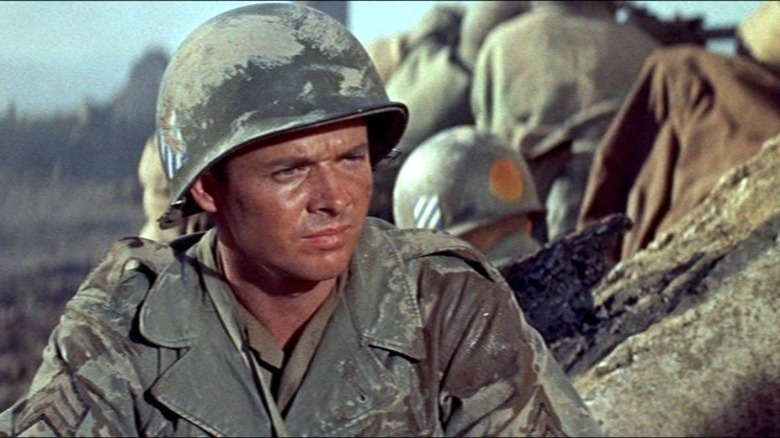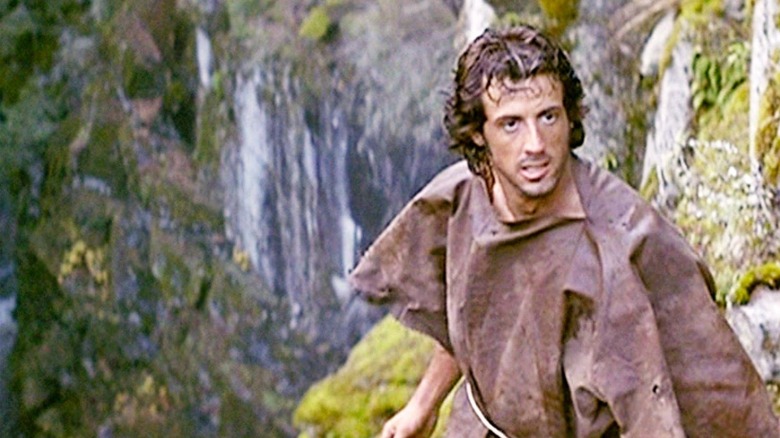Rambo's Defining First Blood Feature Was Put In The Script By Sylvester Stallone
In "Hot Shots! Part Deux," our hero Topper Harley (Charlie Sheen), oiled up and wearing a tank top and red bandana, storms an enemy camp to rescue some hostages. This involves mowing down scores of bad guys with a belt-fed machine gun and, after the first few dozen, a body count appears in the bottom corner. The kills just keep on coming, as the counter indicates the film surpassing "Robocop" and "Total Recall" to become "BLOODIEST MOVIE EVER." At that point, Topper runs out of ammo, but no worries; he just grabs a handful of bullets from an open crate and hurls them at the next wave of cannon fodder, killing them too.
If the first "Hot Shots!" got plenty of mileage out of "Top Gun," "Part Deux" stayed true to sequel tradition by upping the action and the body count, lampooning "Rambo: First Blood Part II" (with Rambo notching up around 70 kills) and "Rambo III" (with Rambo approaching 80 kills out of a triple-digit total for the film). Because one-man army John Rambo (Sylvester Stallone) always kills a lot of bad guys, right?
That's the weird thing about the Rambo sequels — they are almost the complete inverse of Ted Kotcheff's suspenseful original film, "First Blood." The whole point of the first movie was that Vietnam vet Rambo was so damn sick of killing he refused to do any more of it, even when a bunch of local law enforcers were trying to kill him. In the first film he kills one guy, and it's an accident. The reluctance to kill made Stallone's damaged protagonist stand out from so many action heroes of the era, a character trait that came directly from Stallone himself.
So what happens in First Blood again?
John Rambo (Sylvester Stallone) is a Vietnam vet visiting an old war buddy on the outskirts of Hope, Washington, but he's sad to learn the guy died from cancer the previous year due to exposure to Agent Orange. Rambo carries on into town, where he is harassed by Sheriff Teasle (Brian Dennehy), who takes an instant dislike to his long hair and disheveled appearance.
Teasle drives Rambo out of town and points him in the direction of Portland, but Rambo is in no mood to get pushed around. When the sheriff spots him trying to enter town again, he arrests him for vagrancy, resisting arrest, and carrying a concealed weapon. Teasle's deputies, led by the sadistic Galt (Jack Starrett), beat and abuse their prisoner, causing Rambo to have severe flashbacks to his torture at the hands of the Vietcong. He goes berserk, beats up the guards, breaks out of the police station, steals a motorbike, and heads for the mountains with Teasle in pursuit.
Armed only with his hunting knife, Rambo is outgunned and outnumbered. After Galt falls to his death from a helicopter while trying to shoot Rambo off a cliff face, Teasle won't be persuaded that it was an accident and swears revenge. Big mistake. He later discovers Rambo is a war hero, a former Green Beret who is an expert in survival skills and guerilla warfare. As the situation escalates, Rambo's former commanding officer, Colonel Trautman (Richard Crenna), comes in to try to talk him down before it's too late.
Does First Blood still hold up?
"First Blood" is a brilliant, no-nonsense action thriller. Perhaps even more than "Rocky," "Rambo" is the one franchise where the power of the original film was completely diluted by its increasingly cartoonish sequels. The image of Stallone as the greased-up one-man army with a very big gun is difficult to dispel, and I'm always surprised when I revisit "First Blood" to see how low-key it is.
That doesn't mean it lacks excitement; despite the very low body count, it is far more gripping than any of the sequels. It helps that it has real stakes: We instantly empathize with Rambo, and even Dennehy's sheriff isn't just a one-note villain. It's a well-made movie, too. Ted Kotcheff's direction is calm and precise, the screenplay is lean, the cinematography is crisp, and Jerry Goldsmith's score really cranks up the suspense.
Then there are the excellent performances. Many other names were attached to the roles at various points. How about Clint Eastwood, Robert DeNiro, John Travolta or Dustin Hoffman as Rambo? With Burt Lancaster, Robert Mitchum, or Gene Hackman as Sheriff Teasle, and maybe George C. Scott, Kirk Douglas, or even Rock Hudson as Trautman? Some fascinating alternative casting combos are out there, but I don't know if any would have worked better than Stallone, Dennehy, and Crenna, who all inhabit their characters with a sense of unshowy naturalness.
To top it off, "First Blood" also has more substance than many other '80s action movies, one of the earlier films to tackle the subject of traumatized veterans and their reintegration struggles after the Vietnam War.
What was the inspiration for First Blood?
"First Blood" is based on the 1972 novel of the same name by David Morrell, inspired by his conversations with Vietnam veterans during his time at Pennsylvania State University. He told Digital Spy:
"They talked to me after the class about their experiences returning to the United States, and about nightmares and sweats and flinching from loud noises, and ducking for cover if there's a car backfiring. These men also had difficulty in relationships and drinking too much, and a lot of the symptoms we now associate with PTSD. So that became part of my research for the project."
Another big influence on Morrell's novel was the unbelievable exploits of war hero-turned-actor Audie Murphy, who also suffered PTSD-like symptoms when he returned from World War II. Murphy, still in his teens, was already well decorated for his previous heroics before his most amazing feat of bravery (via History). He and his men were ordered to hold a strategic roadway as 250 German troops and six tanks advanced on their position. Murphy ordered his men to fall back while he went into one-man army mode, calling in artillery strikes and holding back the encroaching enemy single-handedly for over an hour, killing or wounding at least 50 Germans in the process.
He won the Medal of Honor for his actions and went home as one of America's most decorated soldiers of the conflict, but it took a heavy toll on him mentally. He suffered nightmares and flashbacks and reportedly kept a loaded gun under his pillow at night.
How Stallone's screenplay changes really made the movie
Sylvester Stallone was director Ted Kotcheff's pick to play John Rambo in "First Blood" and, while Stallone loved the screenplay, he would only accept if he was allowed to make a few vital tweaks. The original script had Rambo killing off National Guardsmen, something Stallone argued audiences would hate. Kotcheff told Filmmaker Magazine:
"He [Rambo] was a Congressional Medal of Honor Winner, a Green Beret, he shouldn't be killing these guys just putting on uniforms for the weekend. As soon as Sylvester said it I knew he was absolutely right; I felt that this should be a guy who's sick and tired of violence. Of his own people being killed. Of the Vietnamese people being killed. The last thing he wants is to come back to America and start killing people."
It was a wise change, making Rambo seem more heroic as he uses nonlethal methods to subdue his tormentors instead.
Another big change came at the end. The original screenplay concluded with Rambo killing himself, which Stallone thought would be too much of a bummer for audiences after putting the hero through the wringer the whole movie. The producers were furious about Kotcheff filming an alternative ending, but test screenings proved him right for listening to his star.
The ending we have now is note-perfect, though it is a double-edged sword: If they'd stuck with the original denouement, we wouldn't have had to suffer four crappy sequels tarnishing the reputation of a great film.
